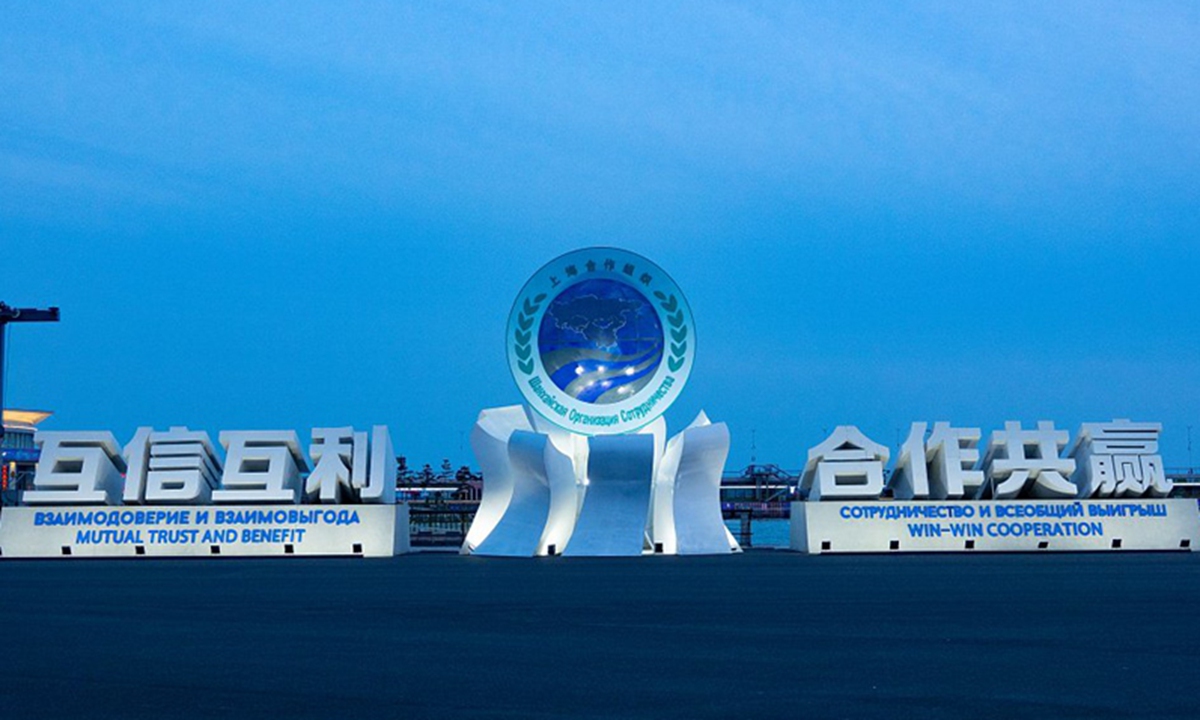
SCO Photo:VCG
After signing its first memorandum of obligations in Uzbekistan at this year's Shanghai Cooperation Organisation (SCO) summit to be held in Samarkand in September, Iran's accession to the full membership of the Euroasia-spanning organization will be finalized by April 2023, the Iranian Embassy in China disclosed to the Global Times on Tuesday.
"Based on the Decision of the Council of Foreign Ministers of the SCO Member States, at the SCO summit in Samarkand on September 15-16, 2022, it will be decided to instruct the Secretary General of the Shanghai Cooperation Organization to sign a Memorandum of Obligations of the Islamic Republic of Iran in order to obtain the status of a member state of the SCO in Uzbekistan, where a first Memorandum of Obligations will be signed, then in April 2023 it will be finalized," the Iranian Embassy said on Tuesday in an exclusive reply to the Global Times inquiries regarding the matter.
"The adoption by the SCO Heads of State Council of the decision on granting to the Islamic Republic of Iran the status of a member state of the SCO at the SCO summit [will be finalized ]in 2023," the Iranian embassy said.
Earlier, Russia media outlet Sputnik reported on Monday that Iran is slated to join the SCO as a full-pledged member state this year and a memorandum of Iran's obligations as a SCO member will also be signed in Samarkand, citing a foreign ministry statement of the organization's rotating chair Uzbekistan.
Uzbekistan's acting foreign minister, Vladimir Norov, also revealed in Moscow that the SCO had received Belarus' application to join the SCO, and that Minsk's admission procedures could begin at the SCO's September summit in Samarkand, Sputnik reported.
Samarkand is a city in southeastern Uzbekistan, where the 2022 annual summit of the SCO Heads of State Council is to be held on September 15-16.
As a country that has been long sanctioned and isolated by the US-led West, Iran, by joining the SCO that accounts for 40 percent of the world's population and 28 percent of global GDP, could expect a breakthrough in its geopolitical and economic status quo, observers said.
Joining the SCO would be an important ingredient in Teheran's implementation of its "Look to the East" policy, which would facilitate its cooperation with SCO members including China and Russia, boost its influence in Central and South Asia, and win a bigger space to break through West's isolation, Zhao Huirong, an expert from the Institute of Russian, Eastern European and Central Asian Studies under the Chinese Academy of Social Sciences, told the Global Times on Tuesday.
It will also be beneficial of deepening Iran's cooperation with China and Central Asia in spheres of fields such as energy and trade, Zhao noted.
"Iran could play a key role in the regional multilateral organization. And with a bigger stage, Iran would feel less lonely," Yin Gang, a research fellow at the Institute of West-Asian and African Studies of the Chinese Academy of Social Sciences, told the Global Times on Tuesday.
Iran has also approached the SCO with a proposal to create a new single currency for carrying out trade among SCO members, in a push to counter the increasing weaponization of the US dollar-dominated global financial system, CGTN reported in June.
Iran's deputy foreign minister for economic diplomacy, Mehdi Safari, told the media in early June that the proposal was sent to SCO nearly two months ago. Iran hopes that the SCO that it views as a "concert of non-Western great powers" will respond to the constantly changing geopolitical landscape and accept its proposal in due course, according to the CGTN report.
When asked if Iran's joining to the SCO would accelerate talks over the matter, Zhao commented that "financial cooperation is an important area of SCO cooperation. In the past, some progress was mainly made in promoting local currency settlements and currency swaps. The use of a single currency is not yet on the agenda.
Taking into account the needs of member countries in terms of financial cooperation, the SCO may expand the scale of local currency settlements and currency swaps in the future, and study the possibility of establishing an independent payment system, Zhao predicted.
Tehran has also officially submitted its application to become a member of the BRICS group as of late June, three members of which are also part of the SCO - China, Russia and India, following a similar move by Argentina
Analysts hailed the trend, saying that more and more emerging economies and developing countries that suffer from US "hegemony and unilateralism" are increasingly appreciating and willing to join truly multilateral groups of SCO and BRICS, as part of their concerted efforts to reject bullying in the forms of "sanctions or economic terrorism."
What's special about the groups of SCO and the BRICS is that the two organizations are not headed by the US, and they are organizations without US, rather than "anti-US" ones, Hua Liming, former Chinese ambassador to Iran, UAE and the Netherlands, told the Global Times on Tuesday.
The US has led and established many organizations with evident hostile intentions, such as a NATO designed to be anti-Russia, and the Quad grouping conceived to be anti-China, Hua pointed out.
By contrast, countries excluded from the US-led groups are working together to establish multilateral mechanisms that are based on pure intention of helping each other and enhancing cooperation, instead of creating conflicts, and objectively speaking, they are balancing off the negative effects of the US-led ones, Hua said.
Zhao dismissed the frequent smears in the West where SCO is hyped to be an "anti-Western alliance."
Neither the SCO or the BRICS is an alliance by definition, as they do not have legally binding military treaties between and among member countries, and no specific third party enemies are targeted by the groups, which otherwise would be essential elements for making a alliance, Zhao said.




